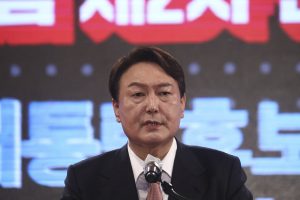Yoon Suk-yeol, a former prosecutor-general in the Moon Jae-in administration, won the presidential primary race of the conservative People Power Party (PPP) on Friday. Yoon won 47.85 percent of the overall vote, beating lawmaker Hong Jun-pyo, who won 41.50 percent, according to the announcement by the head of PPP’s election commission.
“Yoon Suk-yeol is not an individual [anymore] but [represents] the aspiration of people over the recovery of equity and justice,” Yoon said in his victory speech. He also said that the Moon government would fear his candidacy and defined the upcoming presidential election as “a battle between the rationalist and populist.”
The “populist” he referred to is Lee Jae-myung, the presidential candidate of the ruling Democratic Party.
Recent polls have consistently shown that Hong beats Yoon among the general public, but Yoon succeeded in securing nearly 57 percent of the votes from party members while Hong only received 34 percent.
The PPP combined two different electoral systems for its presidential primary race: votes from party members counted for 50 percent of the overall total, and the other 50 percent came from votes by the general public. In total, 6,000 members of the general public participated in four different local pollster surveys to select the PPP’s presidential candidate from Wednesday to Thursday. Hong won a landslide victory in that count, notching 48.21 percent of the votes to Yoon’s 37.94 percent.
Under the party’s electoral system for the presidential primary race, however, Hong could not overcome his lower approval ratings from the majority of the party members – most of whom who are over 50 years old – even though he received more support than Yoon from the general public.
All told, 63.89 percent of 569,059 party members participated in the presidential primary race from Monday to Thursday, recording the highest turnout in the party’s primary election history, according to the PPP’s election commission. Hong had said that the high voter turnout represents the eager participation of younger party members, who have recently joined the party, in voting for him. Early in the primary, Hong’s approval ratings lagged far behind Yoon’s, but he came to top the polls starting in September, after succeeding in garnering support from younger generations. With his younger support base, Hong hoped to replicate the surprising victory of the young Lee Jun-seok, who had lost three elections in the last five years before besting a veteran politician in the PPP’s leadership race. In the end, however, Yoon pulled out the victory thanks to his popularity with the PPP’s core base.
Yoon is now the official opponent to Lee Jae-myung, who won the Democratic Party’s primary race last month. Lee is a leading progressive politician whose emblematic welfare policy is basic universal income. He served as governor of South Korea’s largest province until being tapped as presidential candidate, upon which he had to resign from office.
Yoon’s background, by contrast, is a 26-year career as a prosecutor. Yoon became well-known when he was investigating accusations that the National Intelligence Service had manipulated internet comments to shape favorable public opinion to the conservative party ahead of the 2012 presidential election. Yoon sought to prosecute the NIS’s former head for electoral interference, and also accused his boss, Justice Minister Hwang Kyo-ahn, of interfering in the investigation. His famous words to lawmakers during the parliamentary inquiry – “I am not loyal to the person but loyal to the organization” – brought huge support from progressives. Yoon was viewed as a “just” prosecutor who follows “the principle of equality before the law.”
Still, for his outspokenness Yoon was demoted to work in a rural district’s public prosecutor’s offices until Park Geun-hye, the predecessor of South Korean President Moon Jae-in, was impeached from the office.
After Moon took office, he promoted Yoon to the head of the Seoul District Prosecutor’s Office. In that role, Yoon had to finalize the years-long trial of the impeached Park. At the time, Yoon expressed support for Moon’s initiative to downsize the overwhelming power and authority of prosecutors on investigations – he was widely viewed as a supporter and leading figure in Moon’s initiative to reform the prosecution system.
It was highly expected that Moon would appoint Yoon as a prosecutor-general as soon as the previous appointee finished his term. Although there was some debate over Yoon’s nomination among the members of the ruling Democratic Party and officials in the presidential Blue House, Moon ultimately gave the nod to Yoon.
However, the ruling Democratic Party and Moon’s supporters must desperately want to undo that choice. As it turned out, Yoon mainly used his power to investigate accusations against members of the Moon administration, and he began to belittle the Justice Ministry and the ruling Democratic Party’s prosecution reform agenda after reaching the top prosecutor spot.
Meanwhile, South Korea’s conservative opposition lost major elections in 2018 and 2020 and had no leading figures that grabbed attention as presidential contenders. The party’s approval rating had also lagged far behind the ruling Democratic Party’s since Park’s impeachment. After Yoon began to clash with Moon and his justice minister, the prosecutor-general began to receive high approval ratings as a potential presidential candidate among conservatives and anti-Moon supporters.
Some pro-Park supporters, however, still refuse to support Yoon, blaming him as the main actor who sent their beloved president to jail. When Yoon was leading the investigations into Park’s corruption, his team had sought a sentence of 45 years in jail for the former president.
South Korea’s presidential election is going to be held in March 2022. Experts predict a close election, as the recent polls showed that the two parties are neck and neck.

































